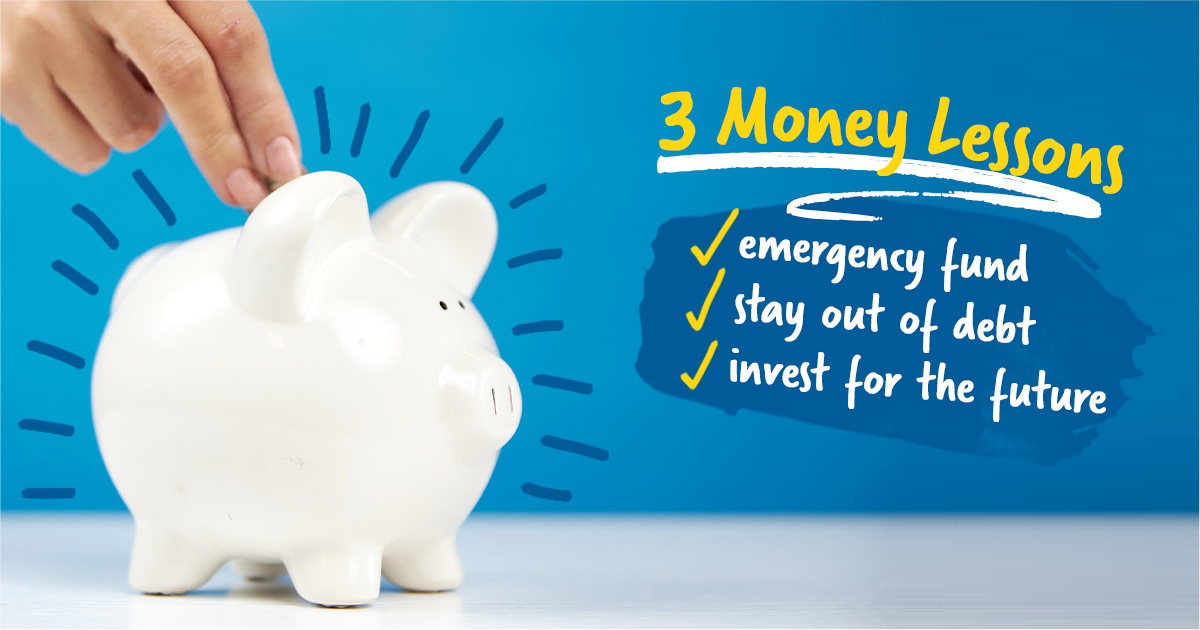
There’s no doubt about it: 2020 has been a roller coaster of a year so far. And when so many things seem to go wrong, it can be hard to find any good in the situation at all (unless you secretly love staying home 24/7—we don’t blame you for that). But if there’s one thing this year has been really good for, it’s highlighting just how crucial it is for students to learn how to manage money wisely so they can plan for the future.
Here are three huge money lessons we can all learn from a crisis—which we’re encouraging teachers like you to teach your students so they’ll be prepared for anything that comes their way!
Lesson 1: Have an emergency fund.
Just like your grandma has (probably) always said, it’s better to be overprepared than underprepared. That’s the whole reason for the emergency fund—something in life is always going to go wrong, whether it’s a sick pet, a broken A/C unit or a global pandemic. Since it’s no use avoiding that fact, it’s better to just be ready in advance.
Are you a teacher? Help your students win with money today!
If you’re familiar with Ramsey’s 7 Baby Steps, you already know that the first Baby Step is to save $1,000 in a starter emergency fund. (And if you aren’t familiar with the plan, it’s not too late. Now’s the perfect time to learn!) A thousand dollars might not sound like much for an emergency, but it’s enough to keep your head above water if something were to happen while you’re paying off debt and building up a fully funded emergency fund of three to six months’ worth of expenses (Baby Steps 2 and 3).
For students, we recommend a $500 emergency fund. As young adults are starting to earn money and pay for more of their own expenses, they’re likely to run into some challenges like a flat tire or cracked phone screen that they’ll need to pay for out of their own pocket. But they’re not completely financially independent yet, so $500 usually does the trick. The Foundations in Personal Finance curriculum outlines the Five Foundations (a modified version of the Baby Steps) and gives plenty of practical ways students can knock out the First Foundation by saving up $500 as fast as possible!
Lesson 2: Stay out of debt.
Nobody wants to be in debt in the middle of a crisis—and sadly, millions of Americans experienced that recently. But you can help your students make sure that will never happen to them! That’s why it’s so important to build a strong financial foundation by becoming debt-free and staying that way. When you have a firm foundation, the storms of life can come and you’re still able to stand your ground.
Plus, crisis or no crisis, young people are constantly bombarded with harmful messages about how you need to use debt in order to get what you want in life. They hear lies like “it’s no big deal to have a car payment” or “it’s chill to pay for your phone in installments” pretty much every day from advertising, friends and sometimes even family members they trust. They need to hear the truth: Debt will only weigh them down.
It’s especially important for students to learn to stay out of debt now, because soon they’re going to have some big decisions to make about whether or not they’ll be going to college. And you know what that means: They’re going to hear the same old story about how they can’t get an education without student loans. But as their teacher, you can be the one to help them understand that a debt-free education is possible so they never have to know the pain and frustration of trying to pay off thousands of dollars in loans. Our Foundations curriculum has an entire chapter dedicated to debunking the lies about student loans and showing students how to cash flow their college education—and stay out of debt for good.
Lesson 3: Invest for the future.
Investing is one of the easiest ways to make your money work for you. Thanks to the magic of compound interest, you can save for retirement even in your sleep! And it’s been proven time and time again that the earlier you start, the more wealth you’ll build to enjoy later in life—and the more financial security you’ll have if and when things get rough. That’s why it’s so important for students to learn this early on.
Another thing that will create more security is diversifying your investment portfolio (aka spreading out your money into multiple different types of investments). This means less risk and more opportunity for that money to grow! These terms might sound a little complex for students, but the high school Foundations curriculum breaks down these concepts in a way that’s easy to understand. After all, the sooner they can latch onto the idea of building wealth for their future selves and future families, the better.
No one can predict when a crisis is coming, and that’s why we can’t wait a minute longer to teach the young people of America how to handle money. They need to learn now so they never have to go through the tough financial times that the adults in their lives have experienced. And you can be the one to empower them and give them hope by starting the money conversation! For more info on how you can equip them with the financial confidence they need, check out Foundations in Personal Finance, available in digital or print for whatever fits your classroom best!


